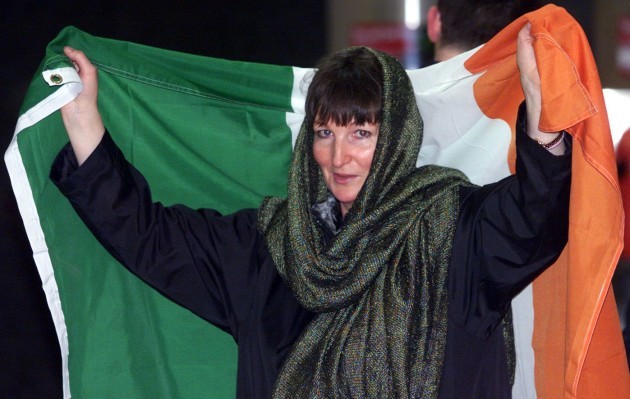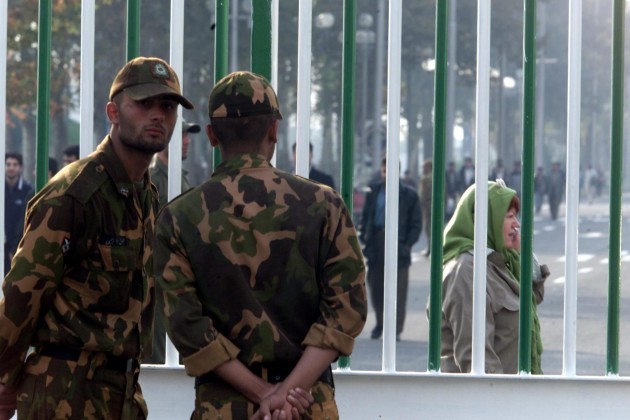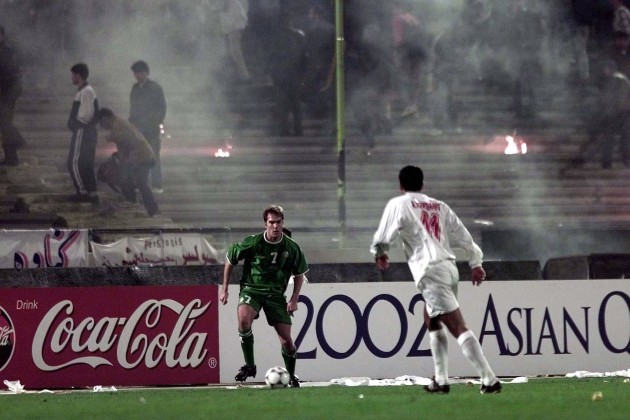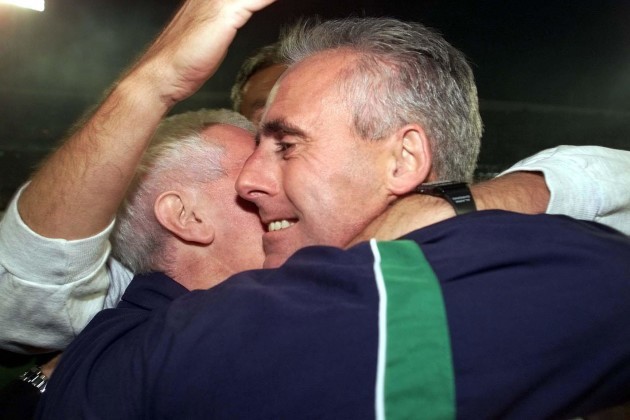IT WAS ON a bleary-eyed Saturday morning that Anne Delaney breezily confronted the repressive world.
“I had been out on the beer after a Bohs match, and then at half eight in the morning my phone rings.
“‘This is the Iranian embassy. You have applied for a visa…’
“I thought it was one of my friends: she’s an awful messer. I said, ‘Yeah, I just want to go to the match, I follow Ireland everywhere and I want to go to the match. That’s all I want to do.’
“It said you had to put £20 into the visa form to pay for it, but I said feck this, if they let me go they’ll ask for the money.
“They asked me if I lived close by, and could I be there by such a time. I jumped out of bed – I was still half-flootered from the night before – I ran out, jumped into a taxi and up to the embassy.”
Thus Anne Delaney caused a media stir by becoming the first Irish woman to be granted a visa to travel to Ireland’s 2002 World Cup play-off in Tehran.
“Then everything went mad: every paper in the country. The Herald rang me [to take a photograph] and I wasn’t home. I ran up to a friend’s house and asked, ‘Have you got a scarf and a hat, this shower are coming!’ I looked like a bleedin’ leprechaun on the front of the Herald!
“Philip Boucher-Hayes came around with me for the Pat Kenny Show, someone else then came around with me. God almighty, I wouldn’t make a celebrity: I wouldn’t be able for it.
“It was even in the English Times, that I was after getting a visa. I had Radio Four ringing me, telling me ‘Do you know they won’t let you go to the match, the High Priest has said…’ Well, I said, ‘I don’t care. If they don’t let me go they don’t let me go, but all I want to do is to go to a match.’”
**********
At that stage, Iran were not letting any women go to football, and hadn’t since the Islamic Revolution of 1979.
The United Nations wrote in September 2001, two months before the Irish game, of the “foundational, legalised discrimination” faced by women in the country, a place where the Islamic dress code was strictly enforced and women were not allowed to apply for a passport or leave the country without the written permission of their husband.
The ban on attending football was an unwritten rule but no less vigorously enforced, predicated on a belief that it was inappropriate for women to witness semi-clad footballers and profane male supporters. The sound levels on the broadcast of matches were kept low to avoid supposedly offensive language being piped into homes.
It was decided, though, that Irish women could go to the game, with a spokesperson for the Iranian soccer federation justifying the decision on the basis that they could not be scandalised by the Farsi swearing they did not understand.
Among those who decided to travel to Tehran was Donna McBride, a photographer who had made her international debut adjacent to the win over Holland at Lansdowne Road earlier in the campaign.
“It half-started as a dare. It was a month after 9/11 and we were ringing up travel agents looking for flights, and people were laughing at me thinking this was a joke, that I was trying to go to Iran.”
She eventually travelled with the squad and the rest of the media, while Anne Delaney was one of eight women who went with the travel company 747.
“We were told before we got off the plane that any women getting off without a headscarf wouldn’t be allowed into the country at all”, remembers Donna. “The instructions were pretty clear from the word go.”
While Anne was among the Irish fans who flew to Malta and only spent the day of the match in Tehran, others spent a couple of days on the ground with Irish feature writers in tow. While some of the focus of these pieces was on the quiddities of the local culture, there was at least as much fondness for our own native genius.
“The cops here have spent the last 20 years looking for illegal drink, and the Irish were here for 24 hours and they found it”, hollered one travelling fan.
Some said they had paid Iranian families to furtively drink in their homes, others have subsequently said they were brought to a shebeen by locals and one fan claimed to have paid for a six-pack of Carlsberg dangling from the window of a car parked by his hotel.
Cars honked and locals waved at every sight of the tricolour: the visiting Westerners were a fascination for locals.
“They were such hospitable people, or at least 99.9% of the time they were”, Donna remembers.
“They loved the Irish. They had great hospitality for the Irish, they even had a Bobby Sands Street. I think they saw us as comrades, against the empire.”
Peer west from Bobby Sands Street in Tehran and you’ll be looking at the back of the British Embassy.
The street was once the main entrance to the Embassy, back when it was titled Winston Churchill Street. It was renamed after the Revolution in 1981, and the British responded by closing its main entrance and creating a new one by knocking through to the nearby Ferdowsi Avenue.
Ahead of the game, Donna was on the Street snapping a couple of Irish fans with tricolours when tens of locals appeared around them in an instant, waving their own flags and chanting I-ran, I-ran.
“The bus driver grabbed my arm and said we’re out of here. It was one of those situations which looked as if it could turn easily from enthusiastic nationalism to something more.”
**********
It was the morning of the game when Anne Delaney and her merry band of groundbreakers touched down and were handed roses by local women.
She had dressed for the culture, if not the weather. “I didn’t realise it was going to be so warm! [The headscarf] was too heavy for the weather. The coat wasn’t too bad as it was a light raincoat that went down to the ground. I thought they can’t send me back for that.”
Rumours were darting around them in the hot, stilted air. The agreement to allow Irish women in had apparently been reneged on, with the deputy governor of Tehran quoted locallly saying the agreement had been “cancelled” as it would provoke fierce reactions from clerics in Iran’s holy city of Qom.
Donna McBride reacted by getting into the game as early as possible.
“I had a bit of bother getting in.
At every stage, they didn’t take my accreditation seriously. They would make me wait and then eventually they would let me pass. Then they wouldn’t allow me down pitchside. Every section of the stadium was caged off. They told me I wasn’t getting on the pitch, ‘You’re a woman, go stand in there until we figure this out.’
“I was put in with a bunch of men, Iranian fans, which was an…interesting experience.”
She was eventually allowed to her place on the side of a pitch engirdled by stands heaving with the frenzied chorus of 100,000 Iranian men.
“You’re looking up and it’s like a Gladiator’s stadium, I was looking up at the crowd thinking, ‘This is bloody terrifying. What’s going to happen here, is there going to be a full-scale riot?”
Anne Delaney was in the crowd, too. Those exclusion rumours were diluted if not quashed as the day passed. They were to be allowed in, but first they thought they may be escorted separately to the stadium and then segregated from the Irish men once inside.
“The lads were protective of us and made sure they were around us when we were going into the ground. We were worried we’d be off in a corner somewhere and they would all be looking at us, but we weren’t, they put us in with the away supporters we’re always in with. It was like a cage.”
Ireland led 2-0 from the first leg and thus even a one-goal defeat would be enough to qualify for the World Cup. Roy Keane, of course, didn’t travel, with an Iranian journalist cutting swiftly to the heart of the Irish football psychodrama by asking Mick McCarthy ahead of the game whether his side was “the Republic of Ireland or the Republic of Roy Keane?”
Before kick-off, an imam called the crowd to prayer over the PA system, which some Irish players mistook for the national anthem and launched into pre-game handshake protocol at its conclusion.
Iran needed to score at least twice, and as the game dragged out without a goal, the atmosphere churned from rousing to sour.
“The result was going Ireland’s way, we were looking safe for qualification”, says Donna.
“The next thing, I notice missiles and debris were passing me and hitting me. I was concentrating on the match, and I didn’t dwell too much on it. I got a few slaps. There were a few rocks that hit my shoulders and back, it was slightly annoying but I didn’t pay too much attention to it.
Ray McManus from Sportsfile came over to me and said, ‘Donna, I think you should go in front of the advertising hoardings. I said ‘What are you talking about?’ Then I looked around and all the debris was just around me. It wasn’t targeted at the pitch: it was targeted at me as I was a woman on the pitch.
“It started to get a bit scary then, so I took Ray’s advice and went in front of the advertising hoarding and that saved me from the debris. One of the security guys came over and told me to get back where I should be, but fair play to Ray, he saved the day again by coming over and telling him in no uncertain terms that if I was put back, all of the photographers were going onto the pitch.”
The focus of the locals’ ire broadened in the closing stages, when Iranian supporters agreed they weren’t going to qualify. They threw bottles on to the pitch and lit newspapers and flags on fire, with Irish fans occasionally caught in the crossfire.
Iran scored late, but their 1-0 win was a 2-1 aggregate defeat. At full-time the pitch was mobbed with security, McCarthy was whisked to a press conference and the players celebrated in the dressing room. Above them, Irish fans learned that some customs are general across the world: they were held back for around half an hour.
“It was the first thing we noticed coming out”, remembers Anne. “They all just disappeared like little ants. When we came out it was empty.”
Instead, angry fans had travelled the roads smashing windows, meaning a simmering day ended along shimmering roads as the Irish bus made its way to the airport across a miles-long carpet of broken glass.
If anyone was looking for a sign that Ireland’s road to the World Cup was going to be uncomfortable…
**********
“Thinking back it’s probably more scary than it was at the time”, reflects Donna.
“Perhaps ignorance is bliss, I was just concentrating on the match. But it’s a good experience to look back on. On the whole, 99.9% of them were lovely, hospitable people and I don’t dwell too much on these people who took chunks out of the stadium to throw at me. There’s always a few nutters.”
“My main memory is being the first to get a visa to go to the match, and that the Irish women were the first to be allowed into a match in Iran”, says Anne.
“It was madness and great fun while it lasted, I had no fear of going there. I remember at that time, we were talking to a local reporter whose sister was mad into football, and wanted to go that match, even if it meant dressing up as a boy.
“I still wonder if she was ever let into a match.”
**********
She is not alone in wondering.
Just as this week was meant to mark Ireland’s latest play-off under Mick McCarthy, it was to be a test of Iran’s policy on allowing women to watch football. Some women were allowed to watch a 2018 friendly with Bolivia, while a few thousand were permitted to attend a 14-0 World Cup qualifier win against Cambodia last October.
In the latter circumstance, their hand was forced by Fifa in appalling circumstances.
A month earlier, 29-year-old Sahar Khodayari set herself on fire outside of a court while she awaited trial having been caught violating dress code in attempting to attend a domestic football match disguised as a man. Awareness of the tragedy spread across the world under #BlueGirl, a reference to the club she supported, Esteghlal of Tehran.
Fifa, mute on the issue for decades, warned Iran they would be kicked out of World Cup qualifying if they did not allow women to attend the Cambodia game. There followed a concession, as 3,500 female fans crammed into a segregated area of a largely empty, 78,000-seater stadium.
This didn’t satisfy everyone. Amnesty International cited the relatively low ticket allocation in branding it a “cynical publicity stunt”, and called for an end to all restrictions on women attending football. That was to be stress-tested this week in a home qualifier with Hong Kong, but football has been suspended as Iran deal with the outbreak of Covid-19.
The present emergency has made this a future battle that might yet find a little bit of encouragement in the past.






